Norway election: Terror survivors run for parliament
- Published
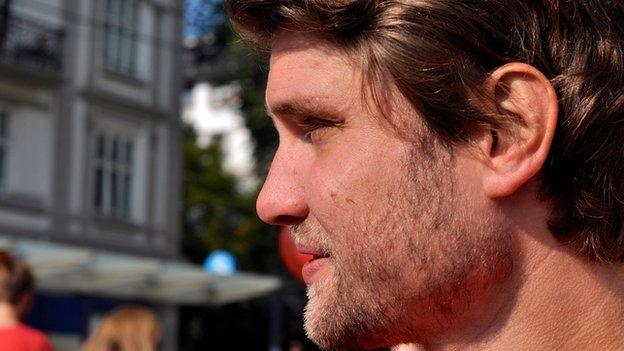
Scores of Vegard Groeslie Wennesland's fellow Labour youth members were shot dead by the extreme right-wing militant Anders Breivik at the Utoeya youth camp near Norway's capital two years ago
Two years after the extreme-right terror attacks on Norway's Labour government and youth movement, voters look set to elect a centre-right government on Monday.
Vegard Groeslie Wennesland has donned his red Labour Party T-shirt for his last day of campaigning ahead of Norway's first parliamentary elections after extreme-right mass killer Anders Breivik's 2011 terror attacks.
Handing out leaflets near Oslo's athletics stadium, Mr Wennesland reflected on what the attacks did to his views on politics.
"Someone tried to kill me and my comrades for what we believe in and that kind of stirs a feeling that it's important work you're doing. You can make a difference through politics - I'm more sure of that now than ever," he told the BBC.
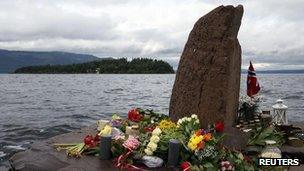
Tokens of remembrance lie on a shore near Utoeya Island in July 2011
Vegard Groeslie Wennesland narrowly escaped Breivik's bullets at the Utoeya youth camp two years ago, but 69 of his fellow Labour youth members were shot dead. Yet people he meets on the campaign trail rarely mention what happened, he said.
"People see me as a regular candidate, and I'm glad for that. I don't want to be a survivor - I'm just a young guy who thinks he can get into parliament and make society a bit more fair."
Country turning to the right
Anders Breivik said his bombing of government headquarters and shooting spree at the Labour youth camp was an attack on social democracy and multiculturalism.
In the months after the attacks that killed a total of 77 people, support for the governing Labour Party grew and popularity ratings for Prime Minister Jens Stoltenberg surged as he led the country through the shock and grief that followed.
Backed by Norway's enormous oil and gas wealth, he also steered the country safely through the economic downturn.
Yet now Mr Stoltenberg's centre-left coalition is set to be ousted by a Conservative-led centre-right group which includes the populist anti-immigration Progress Party, of which Anders Breivik was once a member.
"I think the key reason is a sort of fatigue with the sitting government. They've been in government for eight years, which is quite unique in recent history in this country," said Johannes Berg from the Institute of Social Research in Oslo.
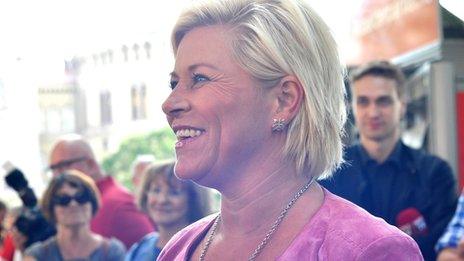
Siv Jensen leads Norway's populist anti-immigration Progress Party, part of the right-wing election alliance
To gain a parliamentary majority, the opposition Conservative Party has for the first time said it would include the Progress Party in a coalition government, but only after the populists moved closer to the centre.
"After the terrorist attacks in 2011 the Progress Party moderated its rhetoric. Immigration became a non-issue," said Johannes Berg.
"The most extreme statements that they've made in the past they can't repeat now."
Progress Party leader Siv Jensen has previously talked about Norway suffering an "Islamification through the backdoor". Critics have said that is uncomfortably close to the rhetoric used by Anders Breivik, who warned of the Islamification of Norway.
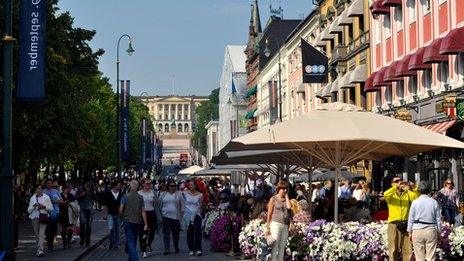
Norway has weathered an economic downturn and enjoys great oil and gas wealth
To Vegard Groeslie Wennesland and other Utoeya survivors now running for parliament, it has been important to remind people what they believe the Progress Party still stands for.
"They always pull this immigration card and try to stir up a conflict between immigrants and Norwegians," said Mr Wennesland.
"It's a rhetoric I despise, they are genuinely wrong. Immigration has been good for the economy and it's been good for Norwegian culture and Norwegian society. I feel like a much richer person when I can work with someone from a different culture."
Shift in focus
Immigration still featured heavily in the Progress Party's manifesto, but a short tram ride from where Mr Wennesland was handing out Labour Party leaflets, Progress Party leader Siv Jensen was focusing on healthcare and infrastructure issues as she addressed her voters.
When pressed, she denied claims that her party's rhetoric had echoes of Anders Breivik and other extreme-right elements.
"I completely disagree with that. The fact that we need a strict and firm immigration policy I think the majority of the Norwegian people agree with. And it has to do with another issue as well - we need to improve integration policies in Norway," Ms Jensen told the BBC.
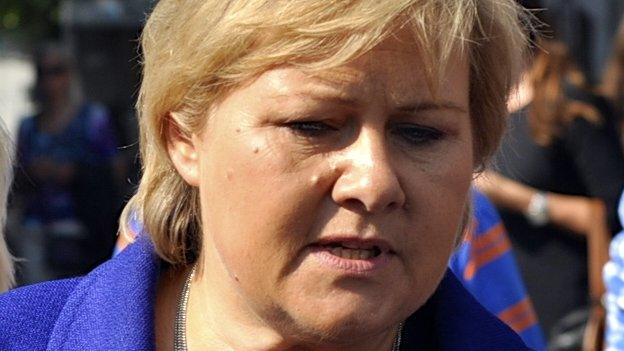
Erna Solberg, who leads the centre-right Conservatives, is likely to be Norway's new prime minister
Immigrants make up 12% of Norway's population. Most come from Poland and Sweden and just 13% of new immigrants list Islam as their religion. The leader of the Conservative Party, Erna Solberg, who is widely tipped to be Norway's next prime minister, wants to continue Norway's existing immigration policies and will have to negotiate with the Progress Party for them to abandon several of their manifesto promises.
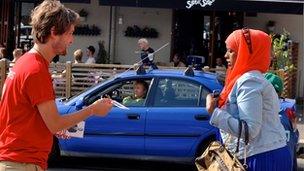
Labour says youth are taking a more active role in politics
"There are some of their proposals that we disagree on. We don't think all asylum seekers should be kept in closed camps [as proposed by the Progress Party]. We have red lines, of course," Mrs Solberg said.
Changing democracy
During his trial last year, Breivik said he carried out his attacks to overthrow Norway's democratic system. As Vegard Groeslie Wennesland packed up his Labour Party election stand on the last day of campaigning, he felt confident Breivik had failed.
"If he changed anything, he made people more active in the democratic organisations that we have - the political parties and other interest groups. The youth movements of the political parties have experienced increases in membership, lots more are actively participating in the elections.
"I hope that this election will show one major change from the previous election, and that is that we have a much higher voter turnout than we've had before," said Mr Wennesland.
If polls are correct, there will be on other change too. Jens Stoltenberg's Labour-led coalition will have to step aside for a new centre-right government.
- Published17 October 2013
- Published11 August 2013
- Published3 September 2013